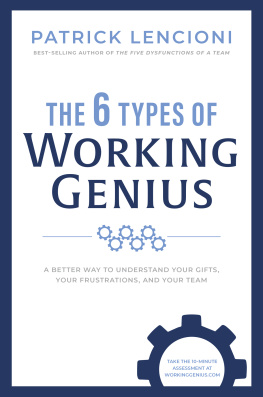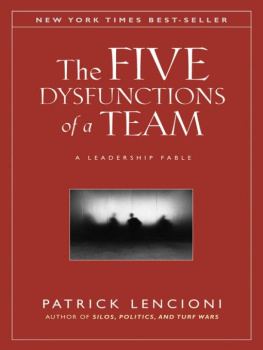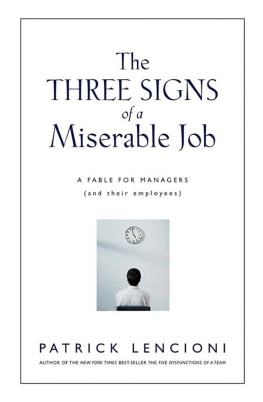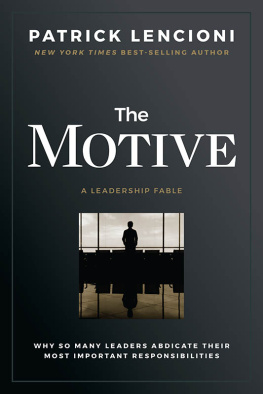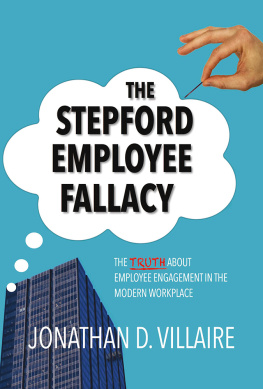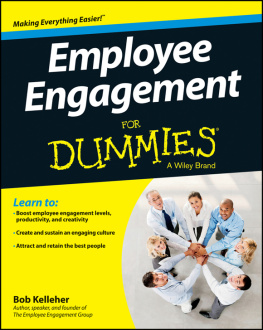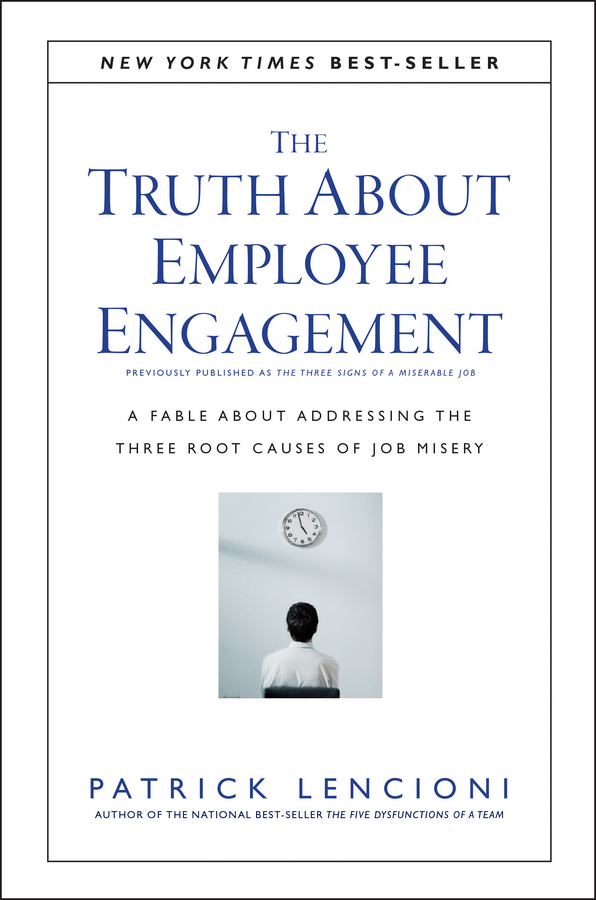
Also by Patrick Lencioni
The Five Temptations of a CEO
The Four Obsessions of an Extraordinary Executive
The Five Dysfunctions of a Team
Death by Meeting
Silos, Politics, and Turf Wars
The Three Big Questions for a Frantic Family
Getting Naked
The Advantage
Overcoming the Five Dysfunctions of a Team
The Ideal Team Player
Copyright 2007 by Patrick Lencioni.
Published by Jossey-Bass
A Wiley Imprint
One Montgomery, Ste. 1200, San Francisco, CA 94104 www.josseybass.com
Originally published in hardcover in 2007 as The Three Signs of a Miserable Job: A Fable for Managers (and Their Employees).
No part of this publication may be reproduced, stored in a retrieval system, or transmitted in any form or by any means, electronic, mechanical, photocopying, recording, scanning, or otherwise, except as permitted under Section 107 or 108 of the 1976 United States Copyright Act, without either the prior written permission of the publisher, or authorization through payment of the appropriate per-copy fee to the Copyright Clearance Center, Inc., 222 Rosewood Drive, Danvers, MA 01923, 978-750-8400, fax 978-646-8600, or on the Web at www.copyright.com. Requests to the publisher for permission should be addressed to the Permissions Department, John Wiley & Sons, Inc., 111 River Street, Hoboken, NJ 07030, 201-748-6011, fax 201-748-6008, or online at www.wiley.com/go/permissions.
All people, companies, and events in this fable are fictitious, except that Nike, Inc., is a real company, used here to represent a recognizable sporting goods and apparel company.
Readers should be aware that Internet Web sites offered as citations and/or sources for further information may have changed or disappeared between the time this was written and when it is read.
Limit of Liability/Disclaimer of Warranty: While the publisher and author have used their best efforts in preparing this book, they make no representations or warranties with respect to the accuracy or completeness of the contents of this book and specifically disclaim any implied warranties of merchantability or fitness for a particular purpose. No warranty may be created or extended by sales representatives or written sales materials. The advice and strategies contained herein may not be suitable for your situation. You should consult with a professional where appropriate. Neither the publisher nor author shall be liable for any loss of profit or any other commercial damages, including but not limited to special, incidental, consequential, or other damages.
Jossey-Bass books and products are available through most bookstores. To contact Jossey-Bass directly call our Customer Care Department within the U.S. at 800-956-7739, outside the U.S. at 317-572-3986, or fax 317-572-4002.
Jossey-Bass also publishes its books in a variety of electronic formats. Some content that appears in print may not be available in electronic books.
Library of Congress Cataloging-in-Publication Data:
Names: Lencioni, Patrick, 1965- author.
Title: The truth about employee engagement : a fable about addressing the three root causes of job misery / Patrick Lencioni.
Description: First edition. | San Francisco, CA :Jossey-Bass & Pfeiffer, [2016]
Identifiers: LCCN 2015038107 (print) | LCCN 2015040961 (ebook) | ISBN 9781119237983 (cloth) | ISBN 9781119238423 (pdf) | ISBN 9781119237990 (epub)
Subjects: LCSH: Employee motivation. | Employee morale. | Job satisfaction. | Management.
Classification: LCC HF5549.5.M63 L46 2016 (print) | LCC HF5549.5.M63 (ebook) | DDC 658.3/14dc23
LC record available at http://lccn.loc.gov/2015038107
Dedication
For my sons, Michael, Casey, Connor, and Matthew.
May the jobs you have in life be purposeful and fulfilling.
Introduction
Work has always fascinated me, though I must admit, sometimes in a slightly morbid way.
I remember as a youngster being stunned and disturbed when I first learned that adults like my dad worked eight hours or more every day at their jobs. That was more time than I spent at school, and I could barely manage that!
And when I was told that many of those adults didn't really like their jobs, I was dumbfounded, unable to comprehend why people would spend so much time away from family and friends and not be happy about what they were doing. I suppose I also feared being in the same situation myself one day.
My fascination with jobs only grew when I too joined the workforce at the age of thirteen. As a summertime busboy at a large restaurant, I worked with waitresses and dishwashers and cooks and bartenders, most of whom were career employees. Later, during college, I spent my summers working as a bank teller, again with full-timers. In both of these jobs, I always found myself wondering whether my coworkers enjoyed their work, and over time I came to the inescapable conclusion that many of them did not.
Which continued to bother me.
My obsession with work reached a whole new level when I graduated from college and landed my first full-time job as a management consultant. That's when I learned aboutand experienced for myselfsomething called the Sunday Blues.
The Sunday Blues are those awful feelings of dread and depression that many people get toward the end of their weekend as they contemplate going back to work the next day. I must admit that there were times toward the beginning of my career when the Sunday Blues began to take hold of me as early as Saturday night.
What was particularly troubling for me then was not just that I dreaded going to work, but that I felt like I should have enjoyed what I was doing. After all, I had landed one of the most sought-after, highest-paying jobs of anyone in my graduating class. I certainly wasn't in the kitchen of a restaurant shoveling other people's food into doggy bags, or standing alone in a bank vault counting cashier's checks. I was doing work that was interesting to me, and I was doing it in an upscale office with breathtaking views of the San Francisco Bay.
That's when I decided that the Sunday Blues just didn't make any sense.
You see, until then I had maintained a theory that eliminating dissatisfaction at work was all about finding the right job. A bad job was one that involved doing menial, boring work for low wages in an unattractive environment. And so I decided that the key to fulfillment and engagement was as simple as finding interesting work that paid well and kept me indoors. But even after having satisfied all those criteria, I was still miserable, which made me wonder if maybe I didn't really like consulting after all.
So I changed careers. And was no happier than I had been before.
My theory about job satisfaction was eroding quickly, especially as I met more and more people with supposedly great jobs who, like me, dreaded going to work. These were engineers and executives and teachers, highly educated people who carefully chose their careers based on their true passions and interests. And yet they were undoubtedly miserable.
The theory crumbled completely when I came across other people with less obviously attractive jobs who seemed to be engaged in their workgardeners and waitresses and hotel housekeepers. And so it became apparent to me that there must be more to employee engagement than I had thought. I wanted to figure out what it was so I could help put an end to the senseless tragedy of job misery, both for myself and for others.
And calling it a tragedy is not hyperbole.
Next page

